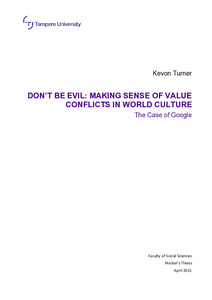Don’t Be Evil: Making Sense of Value Conflicts in World Culture The Case of Google
Turner, Kevon (2021)
Turner, Kevon
2021
Master's Programme in Global Society
Yhteiskuntatieteiden tiedekunta - Faculty of Social Sciences
This publication is copyrighted. You may download, display and print it for Your own personal use. Commercial use is prohibited.
Hyväksymispäivämäärä
2021-05-19
Julkaisun pysyvä osoite on
https://urn.fi/URN:NBN:fi:tuni-202104273750
https://urn.fi/URN:NBN:fi:tuni-202104273750
Tiivistelmä
It has been demonstrated that Google, a microcosm and exemplar of Big Tech, has both flourished commercially, while faltering culturally. This state of tension is underscored by their simultaneous, conflicting commitments to universal accessibility and individual privacy and freedoms. While the antitrust lawsuits leveled against Google show a rebuke of their alleged anticompetitive practices, their position of dominance in the industry shows no sign of letting up. World culture theory explains that such conflicts are inherent in actors, organizations, and world society as a whole. However, there lacks a comprehensive explanation that addresses this phenomenon. Such a gap creates an opportunity to identify and investigate a bona fide example of this concept. This thesis investigates how world-cultural norms and values and their mutual conflicts become visible in the processes in which modern organizations build (and lose) their authority.
In the case of Google and its pending federal antitrust lawsuits, framing theory can reveal much about the world cultural norm conflicts in play and how Google endeavors to remain a model business and model world cultural actor despite their ongoing judicial scrutiny. Through framing, communicators interested in the antitrust cases are able to take the existing world cultural norms and apply them for or against Google as a way to vindicate or villainize them. Therefore, framing theory helps us understand this phenomenon by demonstrating the key frames within the discourse as dictated by world cultural norms. The conflicts in question will play out via the dialogue surrounding Google, and by extension, Big Tech in general.
In the case of Google and its pending federal antitrust lawsuits, framing theory can reveal much about the world cultural norm conflicts in play and how Google endeavors to remain a model business and model world cultural actor despite their ongoing judicial scrutiny. Through framing, communicators interested in the antitrust cases are able to take the existing world cultural norms and apply them for or against Google as a way to vindicate or villainize them. Therefore, framing theory helps us understand this phenomenon by demonstrating the key frames within the discourse as dictated by world cultural norms. The conflicts in question will play out via the dialogue surrounding Google, and by extension, Big Tech in general.
